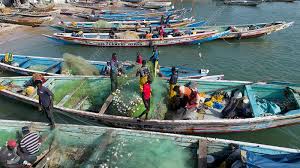Senegal and Guinea-Bissau have signed a fresh two-year protocol in Dakar to allow Senegalese artisanal and industrial fishermen to continue operating in the waters under Guinea-Bissau’s jurisdiction. The agreement, signed yesterday, aims to strengthen marine cooperation, ensure sustainable fisheries management, and enhance food security and socio-economic development for both countries.
The new agreement was signed by Senegal’s Minister of Fisheries, Maritime and Port Infrastructure, Fatou Diouf, and Guinea-Bissau’s Minister of Fisheries and Maritime Economy, Mario Musante da Silva Loureiro. It replaces the previous protocol signed on February 1, 2022, which had been extended twice before expiring on July 31, 2024.
The new protocol provides a wide range of fishing opportunities for Senegalese fishermen in Guinea-Bissau’s maritime territory. For artisanal fishing, Guinea-Bissau has authorised a quota of 200 boats. These include 50 boats with up to 15 horsepower, 100 boats between 15 and 40 horsepower, and 50 boats between 40 and 60 horsepower. This allows a variety of small-scale Senegalese fishers to legally continue their activities in Guinea-Bissau’s waters.
On the industrial side, Guinea-Bissau has granted fishing rights for 1,500 tons of crustaceans, 500 tons of cephalopods, 350 tons of demersal fish, and 500 tons of pelagic fish. The agreement also allows access for 15 pole-and-line tuna vessels. Notably, the protocol includes a clause for renegotiation in case the quota is reached before the agreement expires.
In exchange for access, Senegal has agreed to pay fishing license fees and will also open its maritime and fishing training schools to Guinea-Bissau nationals. This gesture aims to promote regional knowledge exchange and professional development in the marine sector.
The agreement introduces slight increases in fishing fees. Artisanal fishing fees have been increased by 7.5%, while industrial fishing fees saw a 2.5% increase. Additionally, a new tax has been introduced for contributions to the Fisheries Development Fund, which was previously untaxed.
Another key feature of the protocol is the obligation for industrial fishing vessels to land at least 8 tons of fish per vessel per quarter. This condition is designed to ensure that part of the catch benefits the local economy of Guinea-Bissau and contributes to domestic fish supply.
Both ministers praised the new agreement and reaffirmed their commitment to deepening bilateral cooperation, especially in the fisheries sector. They emphasised the importance of joint monitoring, control, and surveillance of fishing activities, as well as research collaboration on fish stock assessments and the health quality of fish, molluscs, and crustaceans.
The agreement, rooted in the original 1978 fisheries convention between the two countries, aligns with broader regional and international efforts to combat illegal, unreported, and unregulated (IUU) fishing. The ministers underscored the need to promote sustainable fishing practices, ensure marine resource protection, and improve data collection for better decision-making.
The two nations also called on private operators in the fisheries sector to formalise their business relationships in order to strengthen trade security and sustainability. By encouraging long-term private sector engagement, they aim to boost investments and generate jobs, particularly in coastal communities.
This bilateral protocol is seen as a major step toward safeguarding shared marine resources, building regional cooperation, and supporting livelihoods that depend on fishing. With fish being a key source of food and income for many West African communities, the agreement is expected to play a vital role in enhancing food security, promoting economic growth, and maintaining ecological balance in the region.
